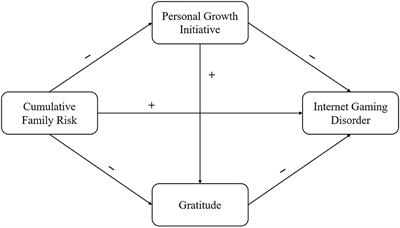
Cumulative Family Risk and Internet Gaming Disorder Among Adolescents: A Serial Mediating Model of Personal Growth Initiative and Gratitude
In the digital era, playing internet games enriches the entertainment forms for young generations. At the same time, it also raises some social issues, and internet gaming disorder (IGD) is one of them. Abundant studies demonstrate that IGD is harmful to individual physiological and psychological he…
- Gan, X., Xiang, G.-X., Li, H., Wang, S.-H., Jin, X., & Zhu, C.-S. (2022). Cumulative Family Risk and Internet Gaming Disorder Among Adolescents: A Serial Mediating Model of Personal Growth Initiative and Gratitude. Frontiers in Public Health, 10, 819324. https://doi.org/10.3389/fpubh.2022.819324
デジタル時代において、インターネットゲームは若い世代の娯楽を豊かにしている。その一方で、インターネットゲーム障害(IGD)はその一つであり、社会的な問題にもなっている。IGDが個人の生理的・心理的健康に有害であることは、多くの研究により証明されている。そのため、この現象の背景となる理由やメカニズムを解明することが必要である。本研究では、生態システム理論に基づき、思春期のIGDに対する家族リスクの累積効果、および個人的成長イニシアチブ(PGI)と感謝の系列媒介効果について、シリアル媒介モデルで検討した。ランダム・クラスター・サンプリングを用いて、600名の中国人青年をサンプルとして募集し、質問票に回答してもらった。回帰分析の結果、累積的な家族リスクは青少年のIGDを正に予測することが示唆された。さらに、PGIと感謝は、累積的な家族リスクとIGDの関係を、別々に、そして順次、媒介することが示された。これらの知見は、青少年のIGDを予防・軽減するための予防・介入に何らかの指針を与える可能性がある。
